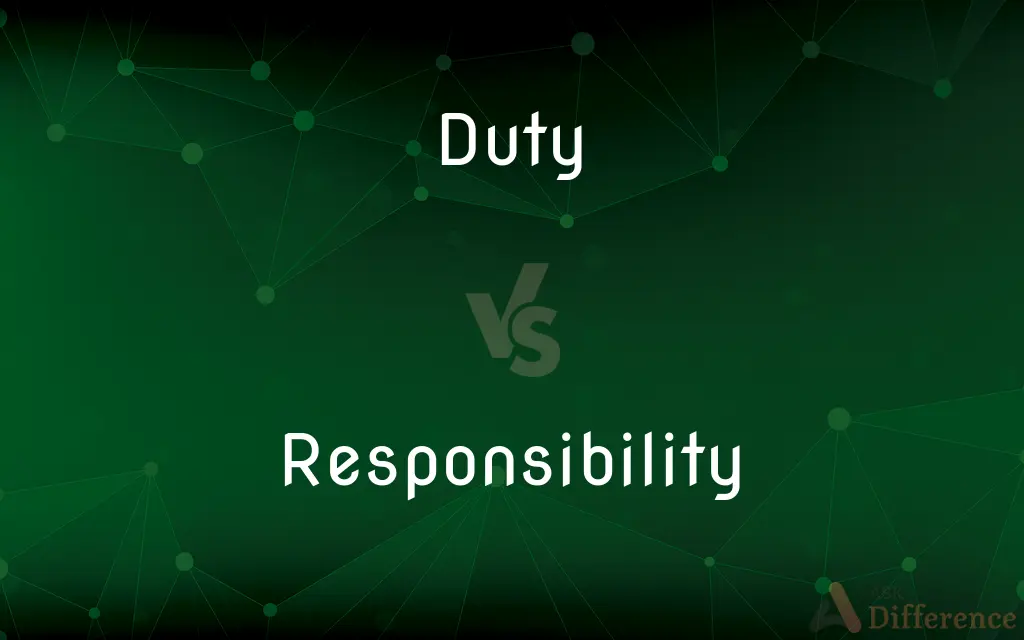Duty vs. Responsibility — What's the Difference?
By Tayyaba Rehman — Updated on September 19, 2023
Duty is a task or action one is required to perform due to position, law, or custom. Responsibility refers to the state of being accountable for something or having an obligation to act in a particular manner.

Difference Between Duty and Responsibility
Table of Contents
ADVERTISEMENT
Key Differences
Duty often stems from external factors like laws, rules, or societal norms, compelling an individual or entity to act in a certain way. Responsibility, conversely, leans more towards an internal sense of commitment to oversee tasks or actions based on one's role or moral compass.
A duty can be seen as more rigid and defined, a specific task or action that one must complete. For instance, a police officer's duty is to uphold the law. Responsibility, however, has broader connotations, encompassing not just actions but also behaviors, attitudes, and potential outcomes. In the same example, the officer has the responsibility to act ethically and ensure public safety.
While duties can often be mandated and have clear consequences if not fulfilled, responsibilities may not always be clearly outlined, and the repercussions for neglecting them can be diverse. For example, a job description may list duties, but the responsibility to be a team player isn't always written.
In many contexts, duty is something owed to others, whereas responsibility can often be a self-imposed obligation. Paying taxes might be seen as a citizen's duty, while voting, though not mandated everywhere, is a responsibility many feel towards their civic roles.
Conclusively, while there's overlap between duty and responsibility, they differ in origins, scope, and implications. Duties are tasks one must perform, while responsibilities encompass a wider range of obligations and expectations.
ADVERTISEMENT
Comparison Chart
Origin
External (laws, rules, norms)
Often internal (moral or role-based)
Scope
Specific task or action
Broader obligations and outcomes
Consequences
Clearly defined repercussions
Diverse and may not be explicit
Imposition
Often mandated
Can be self-imposed
Example
Paying taxes
Voting in elections
Compare with Definitions
Duty
A moral or legal obligation to perform a specific task.
Soldiers have a duty to serve their country.
Responsibility
The onus of ensuring certain tasks or actions are completed.
Safety is everyone's responsibility on a construction site.
Duty
A task or requirement imposed by custom or authority.
Jury duty is a civic obligation in many jurisdictions.
Responsibility
The state of being accountable for actions or outcomes.
Managers have the responsibility to lead their teams effectively.
Duty
A responsibility arising from one's station in life.
Parents have the duty to provide for their children.
Responsibility
An obligation to act ethically or within a set standard.
It's your responsibility to return borrowed items.
Duty
An action required in one's role or position.
It's the lifeguard's duty to watch over swimmers.
Responsibility
The realm over which one has control or must oversee.
The committee took responsibility for planning the event.
Duty
The binding force of something morally or legally mandatory.
The teacher felt it was her duty to report the bullying.
Responsibility
A charge, trust, or duty for which one is answerable.
With freedom comes great responsibility.
Duty
A duty (from "due" meaning "that which is owing"; Old French: deu, did, past participle of devoir; Latin: debere, debitum, whence "debt") is a commitment or expectation to perform some action in general or if certain circumstances arise. A duty may arise from a system of ethics or morality, especially in an honor culture.
Responsibility
The state, quality, or fact of being responsible.
Duty
An act or a course of action that is required of one by position, social custom, law, or religion
The duties of being a critical care nurse.
Responsibility
A duty or obligation that one is responsible for.
Duty
Required action or service
Jury duty.
Beyond the call of duty.
Responsibility
An expense, debt, or financial burden that one must pay.
Duty
Active military service
A tour of duty.
Responsibility
The amount of such expense, debt, or financial burden.
Duty
Moral or legal obligation
It is your duty to tell the truth.
Responsibility
The state of being responsible, accountable, or answerable. 18
Responsibility is a heavy burden.
Duty
The compulsion felt to meet such obligation
Acting out of duty.
Responsibility
The state of being liable, culpable, or responsible for something in particular.
Duty
A tax charged by a government, especially on imports.
Responsibility
A duty, obligation or liability for which someone is held accountable.
Why didn't you clean the house? That was your responsibility!
Duty
The application of something for a purpose; use
The dining room table also does duty as a desk.
Responsibility
(military) The obligation to carry forward an assigned task to a successful conclusion. With responsibility goes authority to direct and take the necessary action to ensure success.
Duty
A measure of efficiency expressed as the amount of work done per unit of energy used.
Responsibility
(military) The obligation for the proper custody, care, and safekeeping of property or funds entrusted to the possession or supervision of an individual.
Duty
The total volume of water required to irrigate a given area in order to cultivate a specific crop until harvest.
Responsibility
The state of being responsible, accountable, or answerable, as for a trust, debt, or obligation.
Duty
That which one is morally or legally obligated to do.
We don't have a duty to keep you here.
Responsibility
That for which anyone is responsible or accountable; as, the resonsibilities of power.
Duty
The state of being at work and responsible for or doing a particular task.
I’m on duty from 6 pm to 6 am.
Responsibility
Ability to answer in payment; means of paying.
Duty
A tax placed on imports or exports; a tariff.
Customs duty; excise duty
Responsibility
The social force that binds you to your obligations and the courses of action demanded by that force;
We must instill a sense of duty in our children
Every right implies a responsibility; every opportunity, an obligation; every possession, a duty
Duty
(obsolete) One's due, something one is owed; a debt or fee.
Responsibility
The proper sphere or extent of your activities;
It was his province to take care of himself
Duty
(obsolete) Respect; reverence; regard; act of respect; homage.
Responsibility
A form of trustworthiness; the trait of being answerable to someone for something or being responsible for one's conduct;
He holds a position of great responsibility
Duty
The efficiency of an engine, especially a steam pumping engine, as measured by work done by a certain quantity of fuel; usually, the number of pounds of water lifted one foot by one bushel of coal (94 lbs. old standard), or by 1 cwt. (112 lbs., England, or 100 lbs., United States).
Duty
That which is due; payment.
When thou receivest money for thy labor or ware, thou receivest thy duty.
Duty
That which a person is bound by moral obligation to do, or refrain from doing; that which one ought to do; service morally obligatory.
Forgetting his duty toward God, his sovereign lord, and his country.
Duty
Hence, any assigned service or business; as, the duties of a policeman, or a soldier; to be on duty.
With records sweet of duties done.
To employ him on the hardest and most imperative duty.
Duty is a graver term than obligation. A duty hardly exists to do trivial things; but there may be an obligation to do them.
Duty
Specifically, obedience or submission due to parents and superiors.
Duty
Respect; reverence; regard; act of respect; homage.
Duty
The efficiency of an engine, especially a steam pumping engine, as measured by work done by a certain quantity of fuel; usually, the number of pounds of water lifted one foot by one bushel of coal (94 lbs. old standard), or by 1 cwt. (112 lbs., England, or 100 lbs., United States).
Duty
Tax, toll, impost, or customs; excise; any sum of money required by government to be paid on the importation, exportation, or consumption of goods.
Duty
Work that you are obliged to perform for moral or legal reasons;
The duties of the job
Duty
The social force that binds you to your obligations and the courses of action demanded by that force;
We must instill a sense of duty in our children
Every right implies a responsibility; every opportunity, an obligation; every possession, a duty
Duty
A government tax on imports or exports;
They signed a treaty to lower duties on trade between their countries
Common Curiosities
Can responsibilities be delegated?
While tasks can be delegated, the ultimate responsibility often remains with the original party.
Can a duty also be a responsibility?
Yes, some duties are also responsibilities if they're seen as moral or role-based obligations.
Is paying taxes a duty or responsibility?
It's a legal duty in many countries, but also seen as a responsibility for the common good.
Can someone have a responsibility without a specific duty?
Yes, one can have a responsibility (like acting ethically) without a specific mandated task.
Can children have duties?
Yes, children might have duties at home or school, like chores or homework.
How do duty and responsibility differ?
Duty is a required task/action due to external factors, while responsibility is an internal obligation or accountability.
Are all duties legally mandated?
No, duties can arise from customs, norms, or personal commitments, not just laws.
Are duties always serious or weighty?
Not necessarily; a duty might be as simple as a routine task or chore.
Do job descriptions outline duties or responsibilities?
They usually list duties, but may also hint at broader responsibilities tied to a role.
Is it everyone's duty to vote?
Voting is often seen as a civic responsibility, but isn't a legal duty in every country.
If someone neglects their duty, are there consequences?
Yes, neglecting a duty often has defined repercussions, especially if it's legally mandated.
How can organizations promote a sense of responsibility?
By fostering a culture of accountability and aligning roles with clear expectations.
Who decides what a person's responsibilities are?
Responsibilities can arise from societal expectations, personal morals, or specific roles.
Do responsibilities change over time?
Yes, as roles, relationships, and circumstances evolve, responsibilities can shift.
Can one have a duty without recognizing it?
Yes, unawareness doesn't negate a duty, but recognizing it helps in its fulfillment.
Share Your Discovery

Previous Comparison
Presumably vs. Assumedly
Next Comparison
Allergist vs. AllergologistAuthor Spotlight
Written by
Tayyaba RehmanTayyaba Rehman is a distinguished writer, currently serving as a primary contributor to askdifference.com. As a researcher in semantics and etymology, Tayyaba's passion for the complexity of languages and their distinctions has found a perfect home on the platform. Tayyaba delves into the intricacies of language, distinguishing between commonly confused words and phrases, thereby providing clarity for readers worldwide.















































